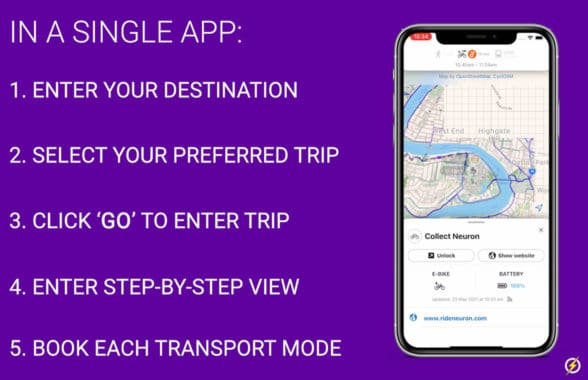
Students and staff at the University of Queensland in Brisbane, Australia, are trialling a multimodal Mobility-as-a-Service (MaaS) app that enables them to purchase a fixed-price prepaid mobility plan for unlimited journeys by bus, train, tram and ferry services across South East Queensland.
The Odin Pass app also allows users to plan and book e-scooters and e-bikes, taxi rides and car and ride-sharing services, make single-trip payments where required, and receive discounts and rewards.
The MaaS app has been developed by the university in partnership with Queensland’s Department of Transport and Main Roads as part of an iMOVE Australia research centre programme to “explore how a shift away from pay-as-you-go transport pricing towards fixed-cost pricing (mobility plans) may affect travel behaviour, in addition to providing consumers with greater options for getting to/from public transport and using active transport modes”.
How it works
Participants in the trial receive access to a multimodal journey planner incorporating real-time transport information and the option of choosing between three 30-day fixed-price “transport plans/bundles” that include different combinations of unlimited travel passes, discounts and rewards.
“The pricing of these passes will vary throughout the trial in order to determine participants willingness to pay for different MaaS offerings,” the iMove research centre explains.
“Participants will then be directed to the MaaS journey planner in the app to plan and book trips. This will be the primary tool users access when planning and booking trips included in their MaaS subscription.
“Individual trips will be recorded for data analysis. Usage will either be billed directly to the user or to a corporate account with the respective mobility service provider (depending on the specific arrangements with different mobility providers). User costs will be subsidised using mobility pass revenue, to incentivise particular modes and behaviours.”
The 12-month trial will initially involve 200 participants with this number “increasing over time, up to a maximum of approximately 10,000 participants — dependent on the extent of the potential shortfall that may emerge between MaaS plan revenue collected and transport usage fees charged by service providers,” iMove adds.
Tailored trips
“The app gives people the option to personally tailor their trips by combining multiple transport options, including focusing on that last mile connection,” Queensland’s transport and main roads minister Mark Bailey adds.
“For example, some people may get off a bus and need to walk some distance to get to their desired destination, so this app will assist students to plan a seamless transition using different transport modes to help them get to their destination faster.
“This is one of the largest real-world MaaS trials undertaken in Australia in terms of the number of service providers and has the potential to shape the future of the industry.
“Being able to plan and test different mobility solutions through a single app is a real game changer, and we’ve also integrated traffic data into the app to provide information on things like road disruptions and suggested alternative routes.”
University of Queensland pilots multimodal subscription-based Mobility-as-a-Service app was written by Tom Phillips and published by NFCW.
